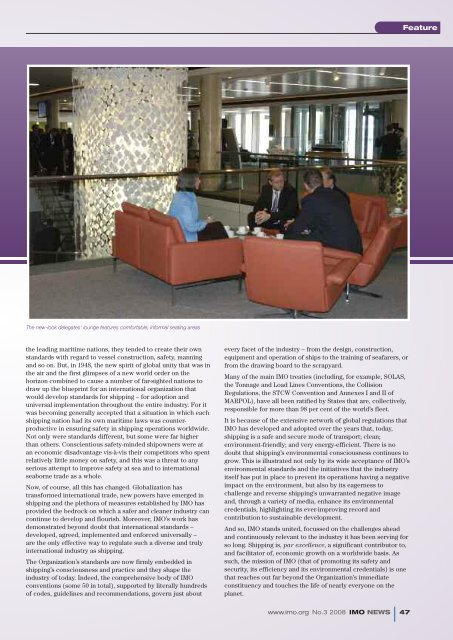IMO News
IMO News
IMO News
Create successful ePaper yourself
Turn your PDF publications into a flip-book with our unique Google optimized e-Paper software.
Feature<br />
The new-look delegates' lounge features comfortable, informal seating areas<br />
the leading maritime nations, they tended to create their own<br />
standards with regard to vessel construction, safety, manning<br />
and so on. But, in 1948, the new spirit of global unity that was in<br />
the air and the first glimpses of a new world order on the<br />
horizon combined to cause a number of far-sighted nations to<br />
draw up the blueprint for an international organization that<br />
would develop standards for shipping – for adoption and<br />
universal implementation throughout the entire industry. For it<br />
was becoming generally accepted that a situation in which each<br />
shipping nation had its own maritime laws was counterproductive<br />
in ensuring safety in shipping operations worldwide.<br />
Not only were standards different, but some were far higher<br />
than others. Conscientious safety-minded shipowners were at<br />
an economic disadvantage vis-à-vis their competitors who spent<br />
relatively little money on safety, and this was a threat to any<br />
serious attempt to improve safety at sea and to international<br />
seaborne trade as a whole.<br />
Now, of course, all this has changed. Globalization has<br />
transformed international trade, new powers have emerged in<br />
shipping and the plethora of measures established by <strong>IMO</strong> has<br />
provided the bedrock on which a safer and cleaner industry can<br />
continue to develop and flourish. Moreover, <strong>IMO</strong>’s work has<br />
demonstrated beyond doubt that international standards –<br />
developed, agreed, implemented and enforced universally –<br />
are the only effective way to regulate such a diverse and truly<br />
international industry as shipping.<br />
The Organization’s standards are now firmly embedded in<br />
shipping’s consciousness and practice and they shape the<br />
industry of today. Indeed, the comprehensive body of <strong>IMO</strong><br />
conventions (some 50 in total), supported by literally hundreds<br />
of codes, guidelines and recommendations, govern just about<br />
every facet of the industry – from the design, construction,<br />
equipment and operation of ships to the training of seafarers, or<br />
from the drawing board to the scrapyard.<br />
Many of the main <strong>IMO</strong> treaties (including, for example, SOLAS,<br />
the Tonnage and Load Lines Conventions, the Collision<br />
Regulations, the STCW Convention and Annexes I and II of<br />
MARPOL), have all been ratified by States that are, collectively,<br />
responsible for more than 98 per cent of the world’s fleet.<br />
It is because of the extensive network of global regulations that<br />
<strong>IMO</strong> has developed and adopted over the years that, today,<br />
shipping is a safe and secure mode of transport; clean;<br />
environment-friendly; and very energy-efficient. There is no<br />
doubt that shipping’s environmental consciousness continues to<br />
grow. This is illustrated not only by its wide acceptance of <strong>IMO</strong>’s<br />
environmental standards and the initiatives that the industry<br />
itself has put in place to prevent its operations having a negative<br />
impact on the environment, but also by its eagerness to<br />
challenge and reverse shipping’s unwarranted negative image<br />
and, through a variety of media, enhance its environmental<br />
credentials, highlighting its ever-improving record and<br />
contribution to sustainable development.<br />
And so, <strong>IMO</strong> stands united, focussed on the challenges ahead<br />
and continuously relevant to the industry it has been serving for<br />
so long. Shipping is, par excellence, a significant contributor to,<br />
and facilitator of, economic growth on a worldwide basis. As<br />
such, the mission of <strong>IMO</strong> (that of promoting its safety and<br />
security, its efficiency and its environmental credentials) is one<br />
that reaches out far beyond the Organization’s immediate<br />
constituency and touches the life of nearly everyone on the<br />
planet.<br />
www.imo.org No.3 2008 <strong>IMO</strong> NEWS 47
















